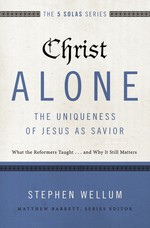 Christ Alone–The Uniqueness of Jesus as Savior: What the Reformers Taught…and Why It Still Matters
Christ Alone–The Uniqueness of Jesus as Savior: What the Reformers Taught…and Why It Still Matters
by Stephen Wellum
Series: The 5 Solas Series
Paperback, 314 pg.
Zondervan, 2017
Read: June 11 – July 9, 2017

So, Stephen Wellum tackles the solus Christus Sola, the exclusivity and sufficiency of Christ as our Redeemer. It doesn’t get the press that some of the others do, but it’s as essential to the Reformation as the rest.
He begins with survey of the Biblical material surrounding the identity of Jesus Christ — as Messiah and as God the Son Incarnate. This was some solid work — I had a hard time engaging with his writing, I can’t say why, but he just didn’t hook me. It likely had to do with the fact that this book was on the heels of outstanding works on the same idea by Machen and Vos — and a related book by Crowe. Wellum demonstrated a lot of familiarity with contemporary scholarship on the topic — from all parts of the spectrum. Every few pages, I’d come across a paragraph or so that’d be really helpful. But the rest was just something I slogged through.
Part 2 focused on Christ’s Atoning work — the heart of the book, for sure. He spends two chapters defending and articulating the doctrine of the Penal Substitution. There is much to commend here — well, much to endorse, I think it could’ve been stated in a more interesting way. The biggest issue I had with his presentation here is that he reduces everything else recorded in the gospels to an “extended prologue” to the passion narratives. That’s not a characterization on my part — he states that.
The third Part focuses on the use of the doctrine in the Reformation and today, both in reference to Roman Catholicism and the wider contemporary culture. I think there was a lot of promise to this section and I wish is was better developed. As it was, it came across half-baked. Although, at this point, I’d pretty much given up on the book and maybe it was better than I thought.
On the whole, this series has been a disappointment to me — I’m going to finish it (I own one I haven’t read yet, and my series OCD is going to compel me to get the last). This one more than the others. I wouldn’t say don’t read it — there’s some really good bits here and there, and there’s nothing wrong anywhere, in fact, it’s pretty helpful. But, I don’t know, I just can’t tell anyone to go grab it, either.
—–



